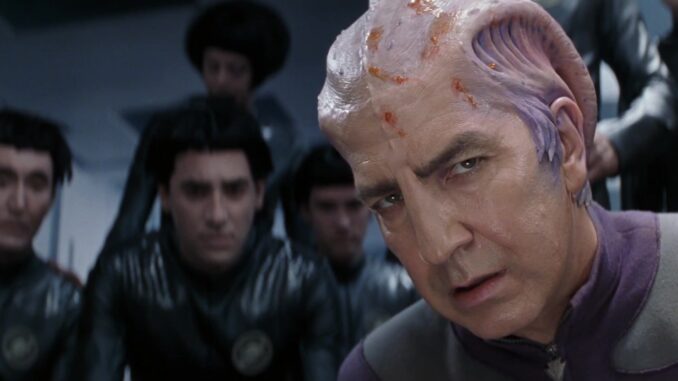
___________________
By Christopher Hooker (Twitter: @GoKartMedia)
I love GALAXY QUEST. I’m so glad the Video CULTure podcast covered this one. It’s a really easy movie to love.
I’m not sure how many people know about this… but I once read a short story that was the setup for GALAXY QUEST. And I have never found it since then. Someone out there, point me in the right direction; this short story exists, and it’s published, and it’s out there somewhere. I’m terrified this is going to turn out to be the Mandela Effect… but I swear it’s real.
It was written in the late seventies and I believed it was published in one of the Star Trek short story collections James Blish helmed. I can’t remember the name of the short story itself, but it was based on “Mirror, Mirror” (otherwise known as “Spock’s Beard”).
The plot of the original story is that during a take, a flustered Bill Shatner suddenly discovers he’s on the actual, real Starship Enterprise and thinks he’s going mad… and Kirk himself beams into the Paramount lot and the actors deal with what they think is Shatner on a method-acting tear. It’s hilarious but goes nowhere. (Someone, please, help me remember where this was published…)

I follow Video CULTure because even though I’m not as into the 80’s aesthetic as the guys are, they often love on the same things I love. When Matt posted the link to their podcast on the website, I piped up about the death of Quellek (Patrick Breen) and how much that moment resonated with me. And I guess that’s really what I’m here writing about: Quellek’s death, and Dane’s character growth being gauged by it, and what that signaled to me as I watched this film in a theater.
I studied screenwriting over in England on a Masters program, and I love a movie with well-rounded structure. My favorite writers insist on them. And while not every character in GALAXY QUEST gets their own personal development, a good number of them do.
For example, Justin Long’s Brandon asserts himself to Allen’s Jason Nesmith, the hero he worshipped who mistreated him. By demanding the star treat him with appropriate dignity, he earns a relationship of respect with him. The Commander Taggart salute that Brandon and his friends get from Nesmith in the last moments is just a perfect moment of a fandom and a star looking across their divide and loving each other.
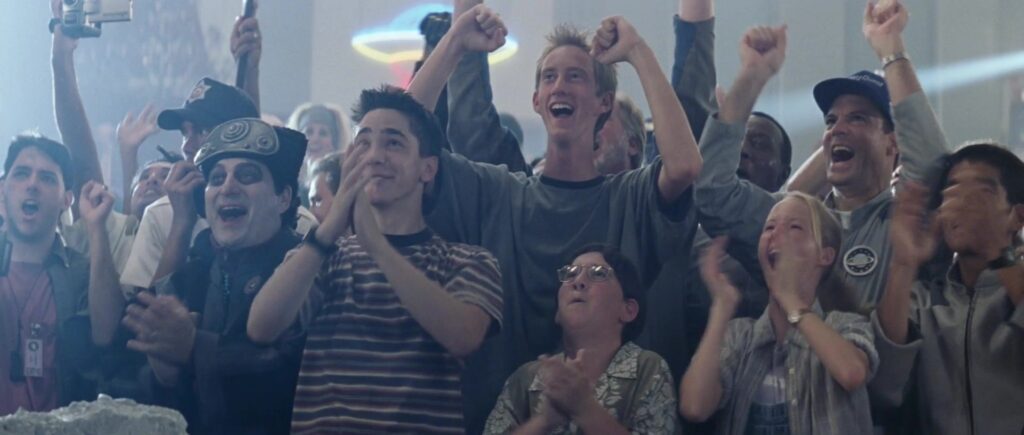
Gwen DeMarco (Weaver) and Jason (Allen) get a romance that develops over the course of the story. It improves as Jason discontinues his selfish path and becomes the leader he pretends to be, looking out for others and putting his crew first, first on an alien planet, and then later in the face of an imminent explosion. When he kisses her, the selfish Nesmith is gone forever; he is their leader and someone DeMarco can truly let herself love.
In fact, the entire cast of the original Galaxy Quest show-within-a-show series gets a bit of growth as they learn to become their characters to defeat the threat against them. I’m not really sure if this is a nod to Mickey Dolenz habit of equating the Monkees learning to become a band capable of playing the songs that were written for them and to record their own music to ‘Leonard Nimoy becoming a real Vulcan’ (which the rest of the band hilariously drags him on in their VH1 Behind The Music biography), but I’d sure like to think it is… the Monkees, after all, were pretenders in a fake band for television who eventually became capable of doing their own music (even if not with great success), not unlike the cast of a fake television show learning to pilot and command a starship. (And I find it interesting, and a bit on the nose, that the protagonist is named Nesmith, Mike Nesmith.)
But the character whose development always stood out for me the most was Alan Rickman’s Alexander Dane. Dane’s a very obvious riff on the trouble Nimoy had for so long with the role of Spock from Star Trek.
Nimoy went so far as to write a book called “I Am Not Spock” back in 1975, to make his point clear to fans. We see Dane sneer and cringe at every moment he has to be reminded of his character, Dr. Lazarus, and his catchphrase (“By Grabthar’s Hammer… by the suns of Worvan… you shall be avenged!”).
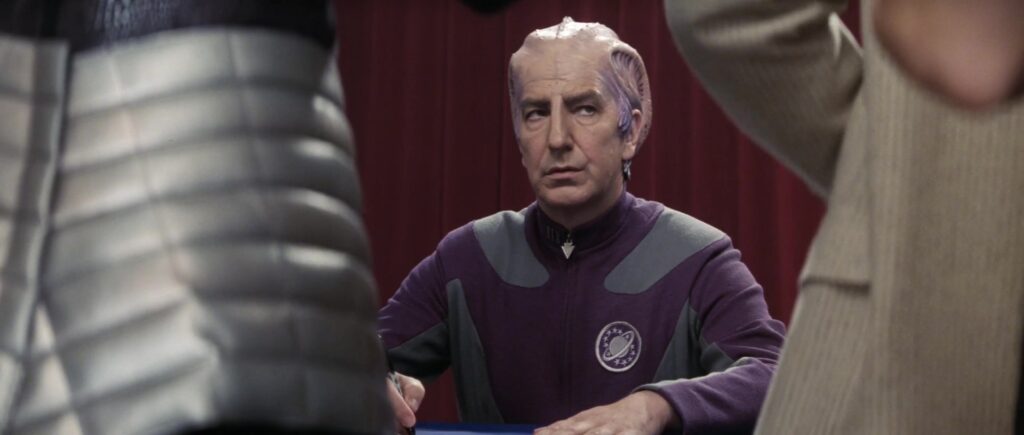
Dane is a character actor who wants desperately to disconnect with a character he feels trapped in and limited by. He is nothing without it and can go no further because of it, trapped in typecasting for the rest of his career.
As Dane and Nesmith use their shared experience from the writing of the show to help them overcome a potentially lethal situation, Dane begins to soften a bit, and actually concedes to using a mantra-chant of Lazarus’ to help his alien cohort, Quellek, pry a door open.
When Quellek is shot, something in Dane breaks, gently. After witnessing Dane firmly stop Quellek from saying the chant earlier in the film, the now fully-committed Dane gives a dying alien his greatest wish… reciting the line, not in the show’s bombastic, proud way, but slowly, personally, and incredibly meaningful to the dying Quellek… what’s more, in the delivery, we can tell that Dane is actually meaning it, not speaking as his character Dr. Lazarus, but saying it as Sir Alexander Dane, caught in outer space in the middle of an alien war.
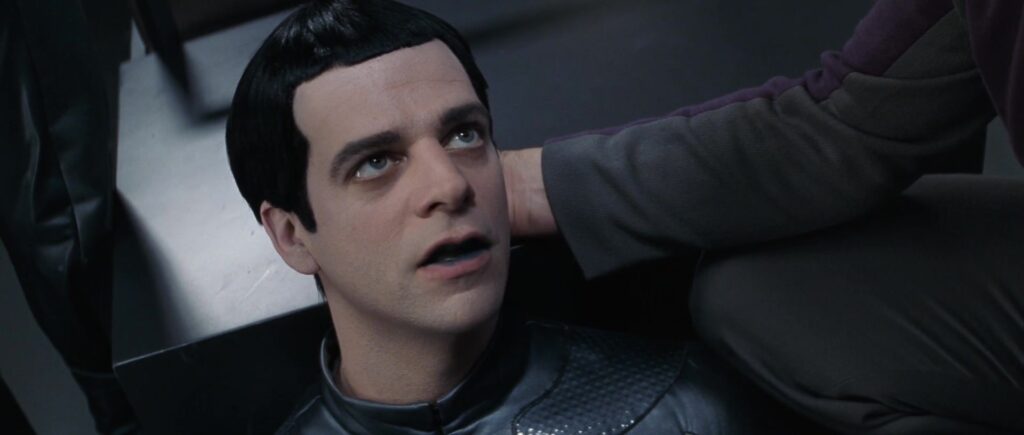
I said this to Matt earlier, and I meant it… Quellek’s death is more affecting than Mr. Spock’s is in STAR TREK 2: THE WRATH OF KHAN. Maybe partially because Spock comes back by the next film… but much of it is Rickman’s Dane, becoming the hero we want him to be… becoming Dr. Lazarus, not for the Thermians or Earth audience of his reality… but for us, for you and me, the Star Trek loving geeks who grew up with the series and still love it.
That scene is one of the most perfect examples of character growth in film, right up there with Michael Corleone becoming his father against his own will. Watching Rickman find the alien who shot his friend and charge him maniacally is a triumphant moment… it’s also a great reminder that Nimoy himself published a follow up to “I Am Not Spock”, 1995’s “I Am Spock”, exactly 20 years after, once he’d had time to come to terms with what fandom had meant to his career.
There is so much that is meta and self-referencing about GALAXY QUEST, puns about ducts aside. It is harsh to Trekkers and also loves them for exactly who they (we) are. It’s a deeply honest film in that regard, able to make fun of people who come up to an actor to ask technical questions they couldn’t possibly know the answer to, and then to show the humanity and heroism of those same characters.
Equally, GALAXY QUEST is honest about the people who starred in Star Trek and that they were, ultimately, just people working on a career. Just actors in a show. Our favorites, but only because we choose to love them and the stories they told.
There will probably never be a Star Trek film as good as GALAXY QUEST is, because although they can thrill us with aliens and spaceships, they would have to work very hard to match the kind of loving embrace that GALAXY QUEST does of Star Trek fans.
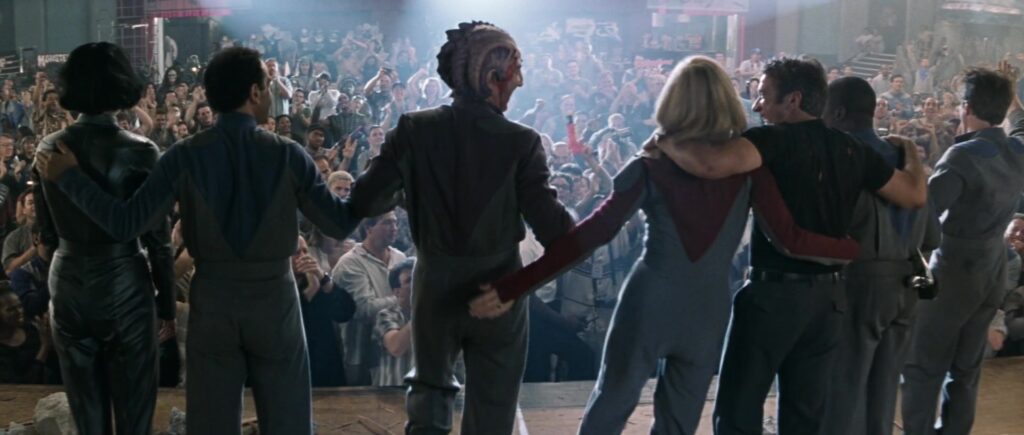
To find out where this film is available to stream, click here: Just Watch
